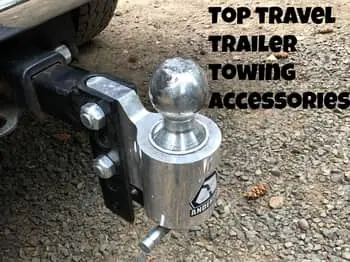What does the Average Travel Trailer Weigh (With 15 Examples)

We researched 15 popular travel trailers from different manufacturers, looked into different lengths, and different styles and found some good answers to the average weight of a travel trailer. Travel trailers vary on weight per foot, this could be a sign of quality, or a sign of using heavier materials. We dive down into average weights below.
What does the average travel trailer weigh?
From our research of 15 examples of popular travel trailers, the average travel trailer weighs 5,215 pounds or about 191.43 pounds per foot of length. These numbers are dry weight from the manufacturer with no supplies, water, gear, foot, or any other items installed.
When searching for a travel trailer, there are several types, sizes, and they all have different weights. We have seen a 19’ travel trailer weigh 3,500 pounds and a 19’ travel trailer weigh 5,600 pounds. This difference in weight can be caused by several factors, how well it is built, how much insulation it has, does it have hardwood cabinets, is it wood frame or aluminum, and many other factors.
Average Camper Weight
We have searched the top 15 examples of popular travel trailers and found that on average, travel trailers weigh 5,215 pounds and weigh 191.43 pounds per foot of length. Different factors can cause these varying weights, but most trailers quality on this list are similar.
| Make/Model | Length | Dry Weight* | Weight Per Foot |
| Bullet 243BHS | 28’10” | 5,013 | 173.88 |
| Winnebago 2106DS | 21’11” | 3,705 | 169.05 |
| Winnebago 29DDBH | 33’9” | 9,995 | 296.15 |
| R-pod RP-190 | 20’4” | 2,785 | 136.98 |
| Rockwood 2104S | 22’4” | 4,816 | 215.67 |
| Tracer 244 Air | 27’ | 5,115 | 189.44 |
| Nash 25C | 28’8” | 5,733 | 200 |
| Outdoors RV 21DBS | 25’5 | 5,675 | 223.33 |
| Aspen Trail LE 26BH | 30’8” | 5,693 | 185.68 |
| Kodiak 283BHSL | 32’10” | 5,704 | 173.74 |
| Coleman Light 2435RK | 27’6” | 5,216 | 189.67 |
| Jayco 27BH | 32’4” | 6,015 | 186.05 |
| Jayco 17RB | 19’10” | 2,890 | 145.74 |
| Airstream 27FB | 28’ | 5,868 | 209.57 |
| Passport 199MLWE | 22’9 | 4,016 | 176.52 |
| Average | 26.8’ | 5,215 | 191.43 |
*Weights listed as dry weight are empty from the trailer manufacturer
What is Dry Weight?
Dry weight is a weight that is listed on the side of a travel trailer from the manufacturer. Dry weight that is listed from the manufacturer can be very misleading. Some manufacturers include two filled propane tanks and batteries in their dry weight calculations, and some manufacturers don’t even include the installed awning as it is listed as an option, which is in most cases mandatory.
To find your exact dry weight on your trailer, unload all of your gear, it is also best to leave on propane tanks and batteries, and go to your local weigh station. Once you have weighed with the trailer, unhitch your trailer from your vehicle and weigh just your vehicle. Subtract these two numbers, and you will have your travel trailer dry weight.
Gear and Fully Loaded Weight
To figure out how much weight you are loading into your RV to make sure you are within your loaded specs, you can complete this in two methods, the scale method and the weigh method.
Utilizing the scale method, you need to know your dry weight by weighing at your local weigh station or dump. First you will bring a scale down to the entrance of your RV. Next you will load your RV with all of your gear and supplies, but before you set your items down, take a weight of yourself holding the gear and subtract from your weight without gear. This will require a notepad to document the weight you have added. This method will take some time, but is simple to do at your house.
The second method to find your exact loaded weight would be to take a dry weight from your local scale. Now load up your trailer with all of your gear and go to the weigh station again. This will give your typical loaded weight. Every time you load up you may have different amounts of gear or food, but you will know if you are at risk of being overloaded or not.
When taking these weights, you will want to make sure you are staying within your cargo carrying capacity (CCC) of your trailer. This will be your dry weight subtracted from your gross weight. Typically your CCC is listed on your trailers sticker on the side, or in your door. You will also want to make sure to include the amount of water you will be loading into your trailer into your calculations. A gallon of water weighs 8.34 pounds. If you have 20 gallons of water, you would add another 166.8 pounds to your weight.
Slides
Slides have a high weight ratio for their size. Usually, if you have a travel trailer with a slide, this feature adds about 800 pounds for the special mechanical gear, frame, and motors. In most cases, a slide is always worth having the extra space, but if you have a specific weight limit you need to meet, you may want to forgo the slide addition. In addition to slides being on the heavy side, they can cause more maintenance and repair and could be a bad idea if you are looking for a smooth turn key trailer.
When determining if you need a slide, read our article on what to look for when buying a travel trailer.
Full Water Tank Weights
Full water, grey, and black tanks can weigh a lot on a travel trailer. For example, our RV has 31 gallons of fresh water capacity plus 6 gallons for the hot water tank. Both the black and grey tanks are 25 gallons each. In total, we can add 87 gallons of liquid in addition to our items in our travel trailer or another 725.58 pounds. Our travel trailer has a high CCC, but some others we have seen only give you about 800 pounds, so with full water tanks, you could not add any gear safely.
We usually fill our water tank about 50% before we travel so we have some water if we need to make a pit stop. Also, we have found some extra weight lower to the ground makes our trailer handle a bit better on the drive. We do travel sometimes at 100% full, but only if we are going off grid.
Theoretically, you would never have the fresh, black, and grey tanks full due to the fact that if you use water to wash, you are moving it from the fresh water to the grey water. The same goes for black tank usage. After a trip, we may drive back with 25% capacity in the fresh, 25% full in the black, and 50% or more in the grey. Read about how long fresh, grey, and black water tanks last.
Keep Towing Vehicle at 80% Capacity
When you are towing your trailer, you want some leeway in your towing capacity. Typically trailer guides recommend 20% extra capacity so you do not overwork your vehicle. This means, if you have a towing capacity of 10,000 pounds, you should only tow 8,000 pounds of trailer, gear, and water. Extensive gear in the back of a pickup could reduce this number as well.
In our case, our truck can tow 8,300 pounds. Our travel trailer dry weight is 3,700 pounds, add 258 pounds for a full tank of water, 500 pounds of accessories (batteries, awnings, propane, etc) 500 pounds of gear (bbq, chairs, generator, gas, power cable, etc.) and another 250 pounds for food and clothing. To estimate on the high side, this could make our trailer weigh 5,208 pounds or about 63% of our towing capacity. We make long trips through high mountains so we wanted some more leeway than 20% extra. We may be overestimating our wet trailer weight, but you can see how if you only had 800 pounds of cargo carrying capacity, you could get in trouble very fast by exceeding your weight.
½ ton Towable Travel Trailers
Many manufacturers are trying to trick consumers by producing marketing for ½ ton towable travel trailers. This may be acceptable in some cases, but we have seen one manufacturer with a 7,306 pound dry weight trailer they are trying to pass along as half ton towable. Technically it could be, but it may not be the best idea and certainly couldn’t be towed with older rigs.
Read our articles about our favorite travel trailers under 5,000 pounds and 3,000 pounds.
Towing Capacity
When checking your towing capacity, always look for the capacity of your specific vehicle. Some general guides may not differentiate your vehicle with a certain gear ratio and motor with another. You can search by your specific VIN to find the options on your vehicle if you do not have an original window sticker to make reference to. For a 1500 Dodge in 2006, one model tows 3,300 pounds and another 1500 with different options tows 8,900 pounds. Different items that could change your towing capacity could be engine size, wheel size, gear ratio, transmission, and bed size if the towing vehicle is a pickup.
To achieve the stated towing capacities, you may need a weight distribution hitch. Read about our favorite model here.
Related Questions
How much does a 16′ travel trailer weigh?
Using the 15 models we pulled weights from and an average weight of 191 pounds per foot, a 16′ travel trailer should weigh about 3,056 pounds.
How much weight do you add to a travel trailer?
On average, you may add 166 pounds of water to fill your 20 gallon tank, another 250 pounds of accessories such as propane and batteries, as well as your gear and food which could be about 300-400 pounds. You can easily add 700-800 pounds to your travel trailer.
Be the first to be notified about FREE tips, hints, coupon codes, and email-exclusive information. All for FREE!












